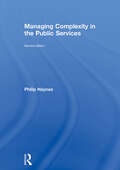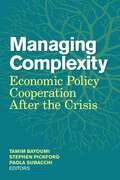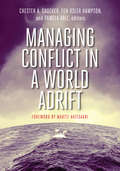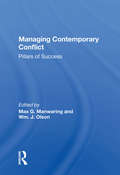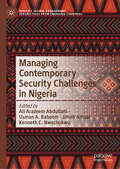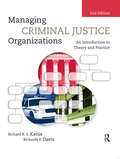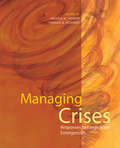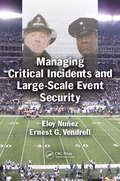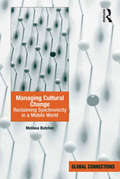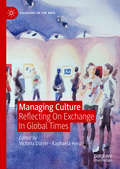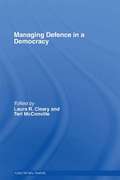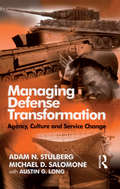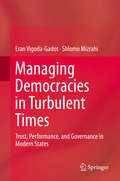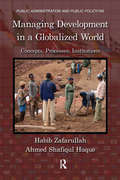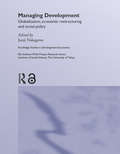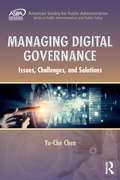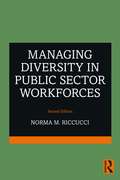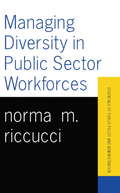- Table View
- List View
Managing Complexity in the Public Services
by Philip HaynesThe application of complexity theory to management and the social sciences has been a key development in theory and practice over the last decade. This approach questions the possibility of finding universal methods of practice, and proposes a pragmatic and humanistic management style that evolves out of a reflective method. The focus is on practitioners observing patterns of similarity and being adaptable in decision-making. Bringing complexity theory into management reveals the importance of organizational culture and effective communication because people, their values and their objectives are at the heart of this method. Information technology provides a framework for complex communication and knowledge use, but it cannot replace highly developed professional negotiations and cooperation. This book argues that the complexity of the public service world limits the usefulness of classical and rational scientific management approaches such as New Public Management. Excessive marketization threatens a collaborative approach and overly rigid approaches to performance management and strategic management can be dysfunctional. Managing Complexity in the Public Services 2nd Edition advances a method of management practice that copes with the stark realities of the complex and unpredictable public policy world. It develops pragmatic management practices from action research that will be valuable to both academics and practitioners. The result is a new value-based practice for the post-crisis public service world.
Managing Complexity: Economic Policy Cooperation after the Crisis
by Tamim Bayoumi Stephen Pickford Paola SubacchiA critical look at the challenges facing international policy cooperation in the new postcrisis environment. The global financial crisis of 2007-09 highlighted the economic interdependencies between all major countries, raising the issues of international cooperation. Managing Complexity: Economic Policy Cooperation after the Crisis looks at how, following the global financial crisis, countries have changed the way they cooperate with each otheron matters of economic policy. In this volume, the result of a joint research project of Chatham House and the International Monetary Fund, researchers and policymakers who were directly involved in the crisis take a critical look at the challenges facing international policy cooperation in the new postcrisis environment and at how the theory and practice of cooperation have evolved as a result of the crisis.
Managing Conflict in a World Adrift
by Fen Osler Hampson Chester A. Crocker Pamela AallThe eagerly anticipated follow up to Leashing the Dogs of War. In the midst of a global political shift where power moves from central institutions to smaller, more disbursed units, another landmark text edited by Chester A. Crocker, Fen Osler Hampson and Pamela Aall provides essential insights and practical guidance. In Managing Conflict in a World Adrift, 40 of the world's leading international affairs analysts examine the relationship between political, social or economic change and the outbreak and spread of conflict. They then consider what this means for conflict management. This panoramic study is the latest volume in a series of titles on conflict management edited by Crocker, Hampson and Aall and follows up on their seminal work Leashing the Dogs of War (2007). For more than a decade, this series of titles has been the definitive resource for students and practitioners of conflict management who want a better understanding of the most contemporary thinking about what causes conflict and how to prevent and manage it.
Managing Conflicts in a Globalizing ASEAN: Incompatibility Management through Good Governance
by Mikio OishiThis book investigates the patterns of conflict management in contemporary Southeast Asia. The region has long been characterized by the twin process of state-formation and nation-building, which has been responsible for most of the region’s intrastate and interstate conflicts. While this process is still ongoing, regional conflicts and their management are increasingly affected by globalisation, which not only serves as a new source of, or exacerbating factor to, conflict, but also makes new instruments available for conflict management. Employing the concepts of incompatibility management and mediation regime, the book analyses the management of seven conflicts in the region: the Rohingya crisis and the Kachin conflict in Myanmar, the Khmer Krom conflict in Vietnam, the West Papua conflict in Indonesia, the political conflict in Thailand, the Mekong River conflicts involving five Southeast Asian countries and China and the transboundary haze problem emanating from Indonesia. The efforts to manage each of them are imagined as constituting a mediation regime, and its effectiveness is assessed in terms of good governance. Among the findings of the book is that the measures of manoeuvring around incompatibilities are employed predominantly in managing regional conflicts. In intrastate conflicts, which mostly involve ethnic minorities, the authorities first aim to eliminate, or impose its own position on, ethnic parties. When this strategy proves unsuccessful, they have no choice but manoeuvre around incompatibilities, which may eventually open up a space for mutual learning. In interstate conflicts, the manoeuvring around strategy works in a more straightforward manner, contributing to regional stability. However, the stability is achieved at the cost of local communities and the natural environment, which absorb the incompatibilities in conflict.
Managing Contemporary Conflict: Pillars Of Success
by Max G ManwaringDeparting from conventional policy rhetoric on the unconventional "new world disorder," Max G. Manwaring, Wm. J. Olson, and their colleagues here build upon Ambassador David C. Miller, Jr.'s three pillars of success for foreign policy and military management. They provide a sound intellectual road map through the dense fog of the contemporary inter
Managing Contemporary Security Challenges in Nigeria (Africa's Global Engagement: Perspectives from Emerging Countries)
by Jimoh Amzat Ali Arazeem Abdullahi Usman A. Raheem Kenneth C. NwachukwuThis book covers a wide range of security issues in Nigeria, including insurgency, terrorism, herder-farmer conflicts, military reforms and internal security, the Nigeria Police Force and security management, intelligence gathering and insecurity, etc. It offers an in-depth assessment of the national security strategies and policies in Nigeria along with a critical assessment of the role of intelligence gathering in security management. It is useful for policymakers, students, and other important stakeholders in the security studies.
Managing Criminal Justice Organizations: An Introduction to Theory and Practice
by Richards P. Davis Richard R.E. KaniaManaging Criminal Justice Organizations: An Introduction to Theory and Practice, 3rd Edition, covers the formal and informal nature of the organizations involved in criminal justice. Kania and Davis provide an introduction to the administration, organization, and management of criminal justice organizations. This management aspect is the key to ensuring the proper running of criminal justice agencies in their efforts to combat crime. The book begins by discussing the eight principles of public management: leading, organizing, deciding, evaluating, staffing, training, allocating, and reporting. It then describes management positions in criminal justice. These include police and law enforcement management; managing the prosecution of criminal suspects; managing bail, bond, and pretrial detention services; managing victim and witness services; managing the judicial system; and managing adult corrections. The remaining chapters cover the pioneers and predecessors of modern public service management theory; leadership in criminal justice; bureaucracies and organizational principles; decision making and planning; performance evaluation, appraisal , and assessment; staffing and personnel issues; training and education for criminal justice; allocation of organizational resources; information management and organizational communications; and future issues in criminal justice management. This text is suitable for introductory criminal justice management courses, preparing students to work in law enforcement, corrections, and the courts. The companion website offers case studies, test banks, lecture slides, and handouts, exercises and forms for use in class.
Managing Criminal Justice Organizations: An Introduction to Theory and Practice
by Richards P. Davis Richard R.E. KaniaThis book studies the formal and informal nature of the organizations involved in criminal justice. It will acquaint readers with the historical developments and application of managerial theories, principles, and problems of managing criminal justice organizations. Covers management positions in criminal justice, historical antecedents, decisionmaking and planning, staffing and personnel, training and education.
Managing Crises, Making Peace
by Maria Raquel Freire Maria Grazia GalantinoThe EU has increased its commitment in response to crises, however, in the face of new threats and emerging crises, its capacity to build a distinctive role in crisis management remains problematic. Resurging divergences in major member states' positions, requiring dual adaptation of the EU level of governance with the national projection of interests, are posing a serious challenge to the objective of a more integrated European defense and security strategy. This collection offers valuableinsights for understanding how a distinctive EU vision on peace missions has emerged and whether it is there to last. Bringing an innovative perspective to European Union engagement in peace operations, this volume combines theoretical reflection with the analysis of empirical case studies that illustrate not only the EU's action in the framework of its Common Security and Defense Policy (CSDP), but also how it engages with other actors in the field including international organisations, non-governmental organisations and local citizens.
Managing Crises: Responses to Large-Scale Emergencies
by Herman B. Leonard Arnold M. HowittFrom floods to fires, tornadoes to terrorist attacks, governments must respond to a variety of crises and meet reasonable standards of performance. What accounts for governments’ effective responses to unfolding disasters? How should they organize and plan for significant emergencies? With fifteen adapted Kennedy School cases, students experience first-hand a series of large-scale emergencies and come away with a clear sense of the different types of disaster situations governments confront, with each type requiring different planning, resourcing, skill-building, leadership, and execution. Grappling with the details of flawed responses to the LA Riots or Hurricane Katrina, or with the success of the Incident Management System during the Pentagon fire on 9/11, students start to see the ways in which responders can improve capabilities and more adeptly navigate between technical or operational needs and political considerations.
Managing Crises: Responses to Large-Scale Emergencies
by Herman B. Leonard Arnold M. HowittFrom floods to fires, tornadoes to terrorist attacks, governments must respond to a variety of crises and meet reasonable standards of performance. What accounts for governments’ effective responses to unfolding disasters? How should they organize and plan for significant emergencies? With fifteen adapted Kennedy School cases, students experience first-hand a series of large-scale emergencies and come away with a clear sense of the different types of disaster situations governments confront, with each type requiring different planning, resourcing, skill-building, leadership, and execution. Grappling with the details of flawed responses to the LA Riots or Hurricane Katrina, or with the success of the Incident Management System during the Pentagon fire on 9/11, students start to see the ways in which responders can improve capabilities and more adeptly navigate between technical or operational needs and political considerations.
Managing Critical Incidents and Large-Scale Event Security
by Eloy Nuñez Ernest G. Vendrell2017 Award Winner of the ASIS Security Book of the Year Nuñez and Vendrell aim to provide the most current and effective resources for managing special events and critical incidents. Their book relies heavily on case studies and after action reports that examine the lessons learned from a multitude of previous events and incidents. In addition, the text identifies and examines best practices and recommended approaches, providing the reader with a variety of checklists and planning tools.
Managing Cultural Change: Reclaiming Synchronicity in a Mobile World (Global Connections Ser.)
by Melissa ButcherDespite decades of policy interventions and awareness raising programmes, migration and mobility continue to give rise to tensions and questions of how to live together in a culturally diverse world. Managing Cultural Change takes a new approach to these challenges, re-examining responses to migration and mobility as part of a process of managing wider cultural change. Presenting research from a range of settings, from liberalising India, global workplaces in Asia, and migrant youth culture in Sydney, this book explores the manner in which cultural change disturbs established frames of reference. In considering affective responses to these liminal moments of disruption, it argues that adaptive strategies such as 'demarcating difference' and 're-placing home', that is, reasserting belonging, are deployed in order to reclaim a sense of synchronicity within the self and with a transforming external environment. With attention to the prevalence and durability of the processes and tensions inherent in cultural change, the author also examines the intercultural, or cosmopolitan, competencies developed in interaction with difference, and whether it is possible to 'teach' people these skills in order to re-find 'cultural fit' and manage change in a constantly shifting world. Contributing to research on transnational migration and mobility studies, while developing the use of conceptual tools such as 'cultural fit' and 'liminality', Managing Cultural Change will be of interest to sociologists, geographers and anthropologists working in the fields of globalisation, migration and transnational communities, ethnicity and identity, belonging and cosmopolitanism.
Managing Cultural Heritage: Ecomuseum, Community Governance and Social Accountability
by Michela MagliacaniManaging Cultural Heritage explores managerial and governance issues within the cultural heritage sector, with particular regard to the ecomuseum. Moreover, a social accountability model is supplied to ecomuseums in order to be accountable towards its shareholder, the local community.
Managing Culture: Reflecting On Exchange In Global Times (Sociology of the Arts)
by Raphaela Henze Victoria DurrerThis book provides new insights into the relationship of the field of arts and cultural management and cultural rights on a global scale.Globalisation and internationalisation have facilitated new forms for exchange between individuals, professions, groups, localities and nations in arts and cultural management. Such exchanges take place through the devising, programming, exhibition, staging, marketing, and administration of project activities. They also take place through teaching and learning within higher education and cultural institutions, which are now internationalised practices themselves. With a focus on the fine, visual and performing arts, the book positions arts and cultural management educators and practitioners as active agents whose decisions, actions and interactions represent how we, as a society, approach, relate to, and understand ourselves and others. This consideration of education and practice as socialisation processes with global, political and social implications will be an invaluable resource to academics, practitioners and students engaging in arts and cultural management, cultural policy, cultural sociology, global and postcolonial studies.
Managing Cyber Attacks in International Law, Business, and Relations
by Jd Scott J. ShackelfordThis book presents a framework to reconceptualize internet governance and better manage cyber attacks. It examines the potential of polycentric regulation to increase accountability through bottom-up action. It also provides a synthesis of the current state of cybersecurity research, bringing features of cyber attacks to light and comparing and contrasting the threat to all relevant stakeholders. Throughout the book, cybersecurity is treated holistically, covering issues in law, science, economics and politics. This interdisciplinary approach is an exemplar of how strategies from different disciplines as well as the private and public sectors may cross-pollinate to enhance cybersecurity. Case studies and examples illustrate what is at stake and identify best practices. The book discusses technical issues of Internet governance and cybersecurity while presenting the material in an informal, straightforward manner. The book is designed to inform readers about the interplay of Internet governance and cybersecurity and the potential of polycentric regulation to help foster cyber peace.
Managing Defence in a Democracy (Cass Military Studies)
by Laura R. Cleary Teri McConvilleAlthough each state is unique it is possible to identify certain common problems and issues with respect to defence governance and management. Governance and Management of Defence is a unique introduction to all the key principles of governance and management through the clear identification of these commonalities. The leading contributors that this volume brings together also show that if individuals are keen to reform practices within their defence establishments they need to be aware of the many constraints and obstacles that may challenge their endeavours. Each contributor is an acknowledged expert in their field and identifes examples of good practice from across the world and the steps taken to implement that practice. This new volume work supports teaching with accessible prompts for reflective activity. The editors recognize that many readers will not be native English speakers, so plain English is used throughout with international examples and case studies to make all the topics and themes clearly relevant and understandable. This is the ideal introductory text for any course that deals with management within the defence sector This book will be of great interest to all students of armed forces and defence management, politics and strategic and military studies.
Managing Defense Transformation: Agency, Culture and Service Change
by Adam N. Stulberg Michael D. SalomoneWhy are some military organizations more adept than others at reinventing themselves? Why do some efforts succeed rapidly while others only gather momentum over time or become sidetracked or even subverted? This book explicates the conditions under which military organizations have both succeeded and failed at institutionalizing new ideas and forms of warfare. Through comparative analysis of some classic cases - US naval aviation during the interwar period; German and British armour development during the same period; and the US Army's experience with counter-insurgency during the Vietnam War - the authors offer a novel explanation for change rooted in managerial strategies for aligning service incentives and norms. With contemporary policy makers scrambling to digest the lessons of recent wars in Kosovo, Afghanistan and Iraq, as well as to meet the unfolding challenges of the new revolution in military affairs (RMA), understanding the sources and impediments to transformation has become critical.
Managing Democracies in Turbulent Times
by Eran Vigoda-Gadot Shlomo MizrahiThis book discusses some of the main challenges that arise in the management of modern democracies, with a focus on the role of citizens and their perceptions of government. A theoretical and practical framework is suggested for dealing with some of the most urgent problems that governments face today: the balance between bureaucracy and democracy and between political and administrative concerns; the pressing economic concerns in a market-based, globalized knowledge society and the changes in the relationship of trust amongst the players. At the heart of the analysis is the idea that running governments effectively means settling the potential conflicts between all those who are involved in the governmental process and in the making of public policy and public actions. The authors suggest approaches for strengthening the trust in democratic institutions and cooperation between the main actors in the democratic sphere, without compromising on the need to ensure effective governance.
Managing Development in a Globalized World: Concepts, Processes, Institutions (Public Administration and Public Policy)
by Ahmed Shafiqul Huque Habib ZafarullahTraditionally, development has been rooted in ideologies and assumptions prevalent in the developed world and in practices and strategies adopted by leading industrial nations. However, historically, eclectic ideas and approaches often clash with existing long-established notions of progress and modes of realizing social and economic change. Managing Development in a Globalized World: Concepts, Processes, Institutions explores this topic by incorporating ideas and interpretations that have previously been neglected or given inadequate attention in the discourse on developing countries. It underscores development as a continuous process that must be supported by sound policies and efficient management, supplying a wider understanding of the field. The authors argue that the application of innovative development techniques and best practices is essential for obtaining optimum results in meeting the needs of society. They examine the style of managing development with a new perspective that links the phenomenon with changing demands and the interplay of internal/external actors and a host of stakeholders. An exploration of key sectors in development provides clear comprehension of problems and solutions. A careful synthesis of theoretical/conceptual and empirical literature, the book assesses real-world situations and provides insight into the operational dynamics of development policies, programs, and institutions. It focuses on goals, values, and dynamics of development management that are undergoing rapid changes and continue to be enhanced to alleviate poverty and improve living standards in an era of globalization and inter-regional and inter-institutional synergies. It highlights best practices essential for the efficient and effective delivery of human development services that are designed and put in place to obtain optimum results in meeting the needs of society.
Managing Development: Globalization, Economic Restructuring and Social Policy (Routledge Studies in Development Economics)
by Junji NakagawaGlobalization in the 1990s provided both opportunities and challenges for developing and transition economies. Though for some, it offered the chance to achieve economic growth through active involvement in the integrated and liberalized world economy, it also increased their vulnerability to external shocks and volatility. As a consequence, stakeholders at every level of the development and transition process – international organizations, national governments and the private sector – had to review their strategies in order to adjust to the new world economic environment. As the Mexican peso crisis of 1994-1995 and the Asian financial crisis of 1997-1998 showed dramatically, the cost of maladjustment was not only very high but it also affected many more stakeholders than before, due to the contagious effects of crises. This revealing book analyzes the different methods employed to manage globalization and development. Bringing together an international team of contributors, including Barbara Stallings, Alicia Giron and J. C. Ferraz, it will prove to be a valuable resource for those involved in the fields of development economics and political economy.
Managing Digital Governance: Issues, Challenges, and Solutions (ASPA Series in Public Administration and Public Policy)
by Yu-Che ChenManaging Digital Governance provides public administrators with a comprehensive, integrated framework and specific techniques for making the most of digital innovation to advance public values. The book focuses on the core issues that public administrators face when using information and communication technologies (ICTs) to produce and deliver public service, and to facilitate democratic governance, including efficiency, effectiveness, transparency, and accountability. Offering insight into effectively managing growing complexity and fragmentation in digital technology, this book provides practical management strategies to address external and internal challenges of digital governance. External challenges include digital inclusiveness, open government, and citizen-centric government; internal ones include information and knowledge management, risk management for digital security and privacy, and performance management of information technologies. Unique in its firm grounding in public administration and management literature and its synergistic combination of theory and practice, Managing Digital Governance identifies future trends and ways to develop corresponding capacity while offering enduring lessons and time-tested digital governance management strategies. This book will serve as an invaluable resource for students, scholars, and practitioners in public administration, management, and governance who aspire to become leaders equipped to leverage digital technologies to advance public governance.
Managing Diversity In Public Sector Workforces
by Norma M. RiccucciPublic and private sector workforces in the U.S. look very different today than they did even 25 years ago. The changes are having a significant effect on how organizations manage their workforces. The old styles of managing heterogeneous workforces are proving to be ineffectual, and so management strategies aimed at embracing diversity and inclusion are essential. These strategies can have positive implications for worker satisfaction, morale and – ultimately – the delivery of public services to the American people. Managing Diversity in Public Sector Workforces, Second Edition examines demographic changes to the U.S. labor force and workplace and the ways in which government employers are managing the diverse populations that now fill public sector jobs. Addressing specific management strategies and initiatives relied on by public sector employers, as well as the implications of effectively managing variegated workforces for the overall governance of American society, this book demonstrates the importance of ensuring that programs to promote inclusiveness and diversity that appear on paper are carried through to practice through implementation. The book begins with a review of equal employment opportunity and affirmative action and the extent to which EEO and AA are still relied upon in the workplace. It then examines law and other public policy issues surrounding EEO, AA and diversity management. The remainder of the book focuses on the core of managing diversity in the public sector, exploring the initiatives, strategies, and programs that government employers either do or might rely on to ensure that the demographic mosaic embodied by their workforces is prepared to meet the needs and interests of the American citizenry of the 21st century. Data are provided on the demographics of the federal, state and local government workforces. Separate chapters address each of the following aspects of diversity: race, ethnicity, gender, LGBTQ employment, physical ability, and the intersection of these constructs. Managing Diversity in Public Sector Workforces, Second Edition will be of interest to students of public administration and public personnel management, and it is essential reading for all those involved in managing public organizations.
Managing Diversity In Public Sector Workforces
by Norma RiccucciAs we enter the twenty-first century, America’s workforce looks markedly different than it ever has before. Compared with even twenty years ago, more white women, people of color, disabled persons, new and recent immigrants, gays and lesbians, and intergenerational mixes now work in America. The way in which government employers embrace this opportunity of diversity will clearly distinguish effective and efficient organizations from those which are unproductive and unable to meet the demands and necessities of the American people in the new century. This book addresses the demographic changes to the labor force and workplace and the ways in which government employers are managing the imminently diverse populations that now fill public sector jobs. It addresses the specific management strategies and initiatives relied upon by public sector employers as well as the implications of effectively managing variegated workforces for the overall governance of American society.
Managing Diversity In Public Sector Workforces
by Norma RiccucciAs we enter the twenty-first century, America's workforce looks markedly different than it ever has before. Compared with even twenty years ago, more white women, people of color, disabled persons, new and recent immigrants, gays and lesbians, and intergenerational mixes now work in America. The way in which government employers embrace this opportunity of diversity will clearly distinguish effective and efficient organizations from those which are unproductive and unable to meet the demands and necessities of the American people in the new century.This book addresses the demographic changes to the labor force and workplace and the ways in which government employers are managing the imminently diverse populations that now fill public sector jobs. It addresses the specific management strategies and initiatives relied upon by public sector employers as well as the implications of effectively managing variegated workforces for the overall governance of American society.
